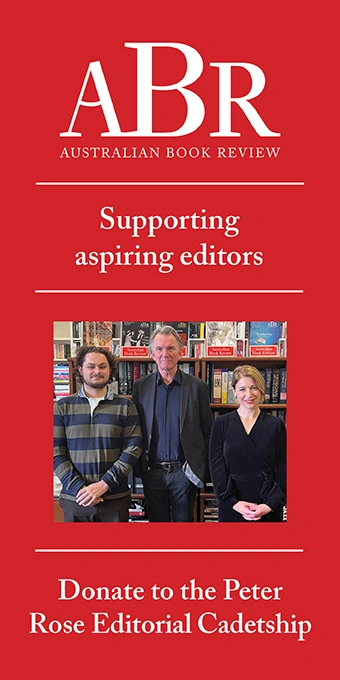Ben Brooker
Ben Brooker is a writer, editor, critic, playwright, essayist, and former bookseller. He has a Bachelor of Arts (Hons) from Flinders University and an Advanced Diploma of Professional Writing from Adelaide College of the Arts. His work has been featured by Overland, New Matilda, New Internationalist, Australian Book Review, RealTime, The Lifted Brow, Witness, and Daily Review.
The closest I have come to attending a high-school reunion was a wedding some years ago at which two of my former classmates were married. At the reception, I saw people I hadn’t thought about in years, including one who spent most of the night drunkenly demanding to know who remembered her from school (I did, vaguely, though this her behaviour made me wish I didn’t). As with the reuniting of ... (read more)
Ever since its beginnings in the late sixteenth century, opera has been preoccupied with death. Illness, murder, and suicide stalk countless libretti, from Mozart’s Don Giovanni and Puccini’s Tosca to Berg’s Wozzeck and Mazzoli’s Breaking the Waves. To the litany of horrific fates which have historically befallen the medium’s protagonists – stabbings, immolations, death by snake bite, ... (read more)
At a desk dimly lit by an overhead lamp sits a rumpled figure with a shock of black hair. He is dressed in white shirtsleeves, dark waistcoat, and slacks, and from beneath the desk peek a pair of grubby, off-white boots. He checks the time on a pocket watch. He yawns. Finally, he produces a set of keys and dangles them in front of his face until he locates the one he is looking for. Having unlocke ... (read more)
Dogs have long been a feature of Markus Zusak’s fiction. His pre-fame trilogy of Young Adult novels, centring on brothers Cameron and Ruben Wolfe and their family, deployed the animal as a metaphor for tenaciousness. In the trilogy’s final book, When Dogs Cry (2001), Cameron and Ruben all but adopt Miffy, a Pomeranian whose scrappiness matches that of the brothers and whose death provides the ... (read more)
Bad Boy is the second work in a series of what playwright Patricia Cornelius and director Susie Dee have called ‘visceral dramatic monologues’. The first, RUNT (2021), centred on the unnamed homunculus of the play’s title, portrayed with memorable physical intensity and dexterity by Nicci Wilks. Bad Boy reunites all three of RUNT’s lead creatives, as well as Romanie Harper (set and co ... (read more)
Milk and Blood are the third and fourth instalments in Benjamin Nichol’s anthology series of works for solo performers. The preceding plays, kerosene and SIRENS, similarly played as a double bill at fortyfivedownstairs a year ago and were roundly lauded (this critic, sadly, did not see them). There are threads which run through these works – in Nichol’s own words, ‘love, loneliness, violen ... (read more)
Given the global resurgence of interest in compounds such as psilocybin, LSD, and ayahuasca, it is a wonder more contemporary novelists have not turned to psychedelic experience for inspiration. It is, after all, hard to think of the golden age of psychedelics – roughly the mid-1960s to mid-1970s – without recalling the trippy, Zeitgeist-capturing literature it produced, including Hunter S. Th ... (read more)
Feminist reimaginings of canonical male-authored texts are nothing new. In fact, following innumerable retellings of the Greek myths, the trend may have peaked last year with the publication of novels spotlighting the marginalised female characters of, among others, Nineteen Eighty-Four (both Katherine Bradley’s The Sisterhood and Sandra Newman’s Julia), Arthurian legend (Sophie Keetch’s Mor ... (read more)
An anthology dedicated to the transnational history of psychedelic drugs and culture seems a timely enterprise. We are twenty or so years into what has become known as the ‘psychedelic renaissance’, the global revival of interest in compounds such as LSD, mescaline, and psilocybin centring on their use alongside psychotherapy as treatments for a growing number of mental health disorders.
Prev ... (read more)





